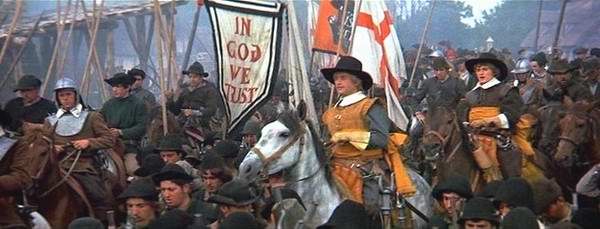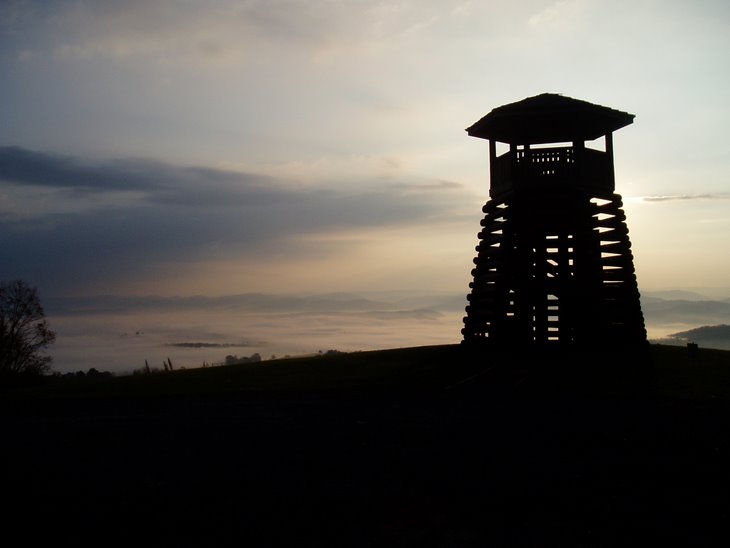 Since I have committed to writing a little something on the Second Commandment concerning the usage of symbols and images of the Trinity in worship I thought I might give you a little to think about concerning the day of our Worship, the Lord's Day. This is an excerpt from a longer work by J.C. Ryle, Anglican Bishop of Liverpool during the 19th Century. Enjoy!
Since I have committed to writing a little something on the Second Commandment concerning the usage of symbols and images of the Trinity in worship I thought I might give you a little to think about concerning the day of our Worship, the Lord's Day. This is an excerpt from a longer work by J.C. Ryle, Anglican Bishop of Liverpool during the 19th Century. Enjoy!Sabbath: A Day to Keep.
Remember the Sabbath Day, to keep it holy.- Exodus 20:8.
There is a subject in the present day which demands the serious attention of all professing Christians in the United Kingdom. That subject is the Christian Sabbath, or Lord's Day.
It is a subject which is forced upon our notice. The minds of many are agitated by questions arising out of it. "Is the observance of a Sabbath binding on Christians? Have we any right to tell a man that to do his business or seek his pleasure on a Sunday is a sin? Is it desirable to open places of public amusement on the Lord's Day?" All these are questions that are continually asked. They are questions to which we ought to be able to give a decided answer.
The subject is one on which "divers and strange doctrines" abound. Statements are continually made about Sunday, which plain unsophisticated readers of the Bible find it impossible to reconcile with the Word of God. If these statements proceeded only from the ignorant and irreligious part of the world, the defenders of the Sabbath would have no reason to be surprised. But they may well wonder when they find educated and religious persons among their adversaries. It is a melancholy truth that in some quarters the Sabbath is wounded by those who ought to be its best friends.
The subject is one which is of immense importance. It is not too much to say that the prosperity or decay of organized Christianity depends on the maintenance of the Christian Sabbath. Break down the fence which now surrounds the Sunday, and our Sunday schools will soon come to an end. Let in the Hood of worldliness and pleasure-seeking on the Lord's Day, without check or hindrance, and our congregations will soon dwindle away. There is not too much religion in the land now. Destroy the sanctity of the Sabbath, and there would soon be far less. Nothing in short, I believe, would so thoroughly advance the kingdom of Satan as to withdraw legal protection from the Lord's Day. It would be a joy to the infidel; but it would be an insult and offence to God.
I ask the attention of all professing Christians, while I try to say a few plain words on the subject of the Sabbath. As a minister of Christ, a father of a family, and a lover of my country, I feel bound to plead on behalf of the old Christian Sunday. My sentence is emphatically expressed in the words of Scripture -- let us "keep it holy." My advice to all Christians is to contend earnestly for the whole day against all enemies, both without and within. It is worth a struggle.
1. THE AUTHORITY OF THE SABBATH
Let me, in the first place, consider the authority on which the Sabbath stands.
My own Firm conviction is, that the observance of a Sabbath Day is part of the Eternal Law of God. It is not a mere temporary Jewish ordinance. It is not a man-made institution of priest-craft. It is not an unauthorized imposition of the Church. It is one of the everlasting rules which God has revealed for the guidance of all mankind. It is a rule that many nations without the Bible have lost sight of, and buried, like other rules, under the rubbish of superstition and heathenism. But it was a rule intended to be binding on all the children of Adam.
What saith the Scripture? This is the grand point after all. What public opinion says, or newspaper writers think, matters nothing. We are not going to stand at the bar of man when we die. He that judgeth us is the Lord God of the Bible. What saith the Lord?
(a) I turn to the history of Creation. I there read that "God blessed the seventh day and sanctified it" (Gen. 2:3). I find the Sabbath mentioned in the very beginning of all things. There are five things which were given to the father of the human race, in the day that he was made. God gave him a dwelling-place, a work to do, a command to observe, a helpmeet to be his companion, and a Sabbath Day to keep. I am utterly unable to believe that it was in the mind of God that there ever should be a time when Adam's children should keep no Sabbath.
(b) I turn to the giving of the Law on Mount Sinai. I there read one whole commandment out of ten devoted to the Sabbath Day, and that the longest, fullest, and most detailed of all (Exod. 20:8-11). I see a broad, plain distinction between these Ten Commandments and any other part of the Law of Moses. It was the only part spoken in the hearing of all the people, arid after the Lord had spoken it, the Book of Deuteronomy expressly says, "He added no more" (Deut. 5:22). It was delivered under circumstances of singular solemnity, and accompanied by thunder, lightning, and an earthquake. It was the only part written on tables of stone by God Himself. It was the only part put inside the ark. I find the law of the Sabbath side by side with the law about idolatry, murder, adultery, theft, and the like. I am utterly unable to believe that it was meant to be only of temporary obligation.1
(c) I turn to the writings of the Old Testament Prophets. I find them repeatedly speaking of the breach of the Sabbath, side by side with the most heinous transgressions of the moral law (Ezek. 20:13, 16, 24; 22:8, 26). I find them speaking of it as one of the great sins which brought judgments on Israel and carried the Jews into captivity (Neh. 13:18; Jer. 17:19-27). It seems clear to me that the Sabbath, in their judgment, is something far higher than the washings and cleansings of the ceremonial law. I am utterly unable to believe, when I read their language, that the Fourth Commandment was one of the things one day to pass away.
(d) I turn to the teaching of our Lord Jesus Christ when He was upon earth. I cannot discover that our Savior ever let fall a word in discredit of any one of the Ten Commandments. On the contrary, I find Him declaring at the outset of His ministry, "that He came not to destroy the law but to fulfil," and the context of the passage where He uses these words, satisfies me that He was not speaking of the ceremonial law, but the moral (Matt. 5:17). I find Him speaking of the Ten Commandments as a recognized standard of moral right and wrong: "Thou knowest the Commandments" (Mark 10:19). I find Him speaking eleven times on the subject of the Sabbath, but it is always to correct the superstitious additions which the Pharisees had made to the Law of Moses about observing it, and never to deny the holiness of the day. He no more abolishes the Sabbath, than a man destroys a house when he cleans off the moss or weeds from its roof. Above all, I find our Savior taking for granted the continuance of the Sabbath, when He foretells the destruction of Jerusalem. "Pray ye," He says to the disciples, "that your flight be not on the Sabbath Day" (Matt. 24:20). I am utterly unable to believe, when I see all this, that our Lord did not mean the Fourth Commandment to be as binding on Christians as the other nine.
(e) I turn to the writings of the Apostles. I there find plain speaking about the temporary nature of the ceremonial law and its sacrifices and ordinances. I see them called "carnal" and "weak." I am told they are a "shadow of things to come," -- "a schoolmaster to bring us to Christ,' and "ordained till the time of reformation." But I cannot find a syllable in their writings which teaches that any one of the Ten Commandments is done away. On the contrary, I see St. Paul speaking of the moral law in the most respectful manner, though he teaches strongly that it cannot justify us before God. When he teaches the Ephesians the duty of children to parents, he simply quotes the Fifth Commandment: "Honour thy father and mother, which is the first commandment with promise" (Rom. 7:12; 13:8; Eph. 6:2; 1 Tim. 1:8). I see St. James and St. John recognizing the moral law, as a rule acknowledged and accredited among those to whom they wrote (James 2:10; 1 John 3:4). Again I say that I am utterly unable to believe that when the Apostles spoke of the law, they only meant nine commandments, and not ten.'
The second point I propose to examine, is the purpose for which the Sabbath was appointed.
I feel it imperatively necessary to say something on this point. There is no part of the Sabbath question about which there are so many ridiculous misstatements put forward. Many are raising a cry in the present day, as if we were inflicting a positive injury on them in calling on them to keep the Sabbath holy. They talk as if the observance of the day were a heavy yoke, like circumcision and the washings and purifications of the ceremonial law.
But the Sabbath is God's merciful appointment for the common benefit of all mankind It was "made for man" (Mark 2:27). It was given for the good of all classes, for the laity quite as much as for the clergy. It is not a yoke, but a blessing. It is not a burden, but a mercy. It is not a hard wearisome requirement, but a mighty public benefit. It is not an ordinance which man is bid to use in faith, without knowing why he uses it. It is one which carries with it its own reward. It is good for man's body and mind. It is good for nations. Above all, it is good for souls...












No comments:
Post a Comment